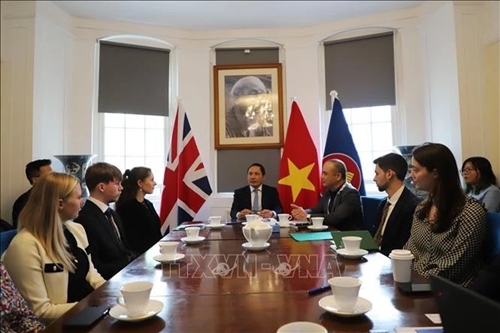The event was jointly organized by the Vietnamese Embassy in the U.K. and the British Embassy in Vietnam, with the aim of further promoting bilateral ties in these areas.
    |
 |
|
Vietnamese Ambassador to the U.K. Do Minh Hung (center) delivers the opening remarks at the the workshop in London on June 9. |
In his remarks, Vietnamese Ambassador to the U.K Do Minh Hung underscored the impressive growth in bilateral trade in recent years, facilitated by the U.K. – Vietnam Free Trade Agreement (UKVFTA). He noted that the U.K.'s accession to the Comprehensive and Progressive Agreement for Trans-Pacific Partnership (CPTPP) is expected to further strengthen trade between the two nations.
Hung expressed his hope for cooperation to be expanded to high-tech sectors such as AI, semiconductor, green technology, and fintech.
Trade Counsellor at the Vietnamese Embassy in the U.K. Le Dinh Ba highlighted opportunities for bilateral trade and investment, citing Vietnam’s dynamic economy of over 100 million people and the U.K.’s position as a high-income consumer market. He emphasized that the UKVFTA and CPTPP have significantly improved market access for both sides' goods and services, including finance, consulting, and education.
Olivia Herford, head of free trade agreement utilization at the U.K. Department for Business and Trade, echoed these remarks. She said agreements like the UKVFTA and CPTPP are powerful instruments for further strengthening bilateral trade by lowering export and import barriers, improving market access, and reducing costs.
Speaking to the Vietnam News Agency (VNA), Herford noted that while trade in goods has expanded rapidly due to tariff elimination under the UKVFTA, there remains considerable potential for growth in services and digital trade. She stressed the importance of the digital provisions in the CPTPP, such as the recognition of electronic signatures and documents, which can facilitate commercial transactions as the two countries are geographically distant.
She further identified green technology, fintech, health care, and many others as promising areas for deeper collaboration. Regular exchanges between businesses and experts, she said, will allow the countries to share knowledge, overcome challenges, and fully capitalize on the benefits of existing trade agreements.
Nguyen Trung Kien, First Secretary for Science and Technology at the Vietnamese Embassy in the U.K., highlighted the potential for enhanced bilateral collaboration in science, technology, and innovation. He proposed the U.K. Department for Business and Trade and the British Embassy in Vietnam work closely with Vietnam’s Ministry of Science and Technology, localities, and technology associations to jointly identify research priorities, organize technology forums and workshops, and maintain regular dialogue on cooperation opportunities.
Bilateral trade and technological relations have achieved encouraging progress over the past years. In 2024, two-way trade hit a record of over 8.4 billion USD, up 18% from the previous year. Major traded goods included electronics, garments, footwear, agricultural products, pharmaceuticals, chemicals, machinery, and automobiles.
Last year, the U.K. was Vietnam’s third-largest trading partner in Europe, while Vietnam became the U.K.’s 35th biggest globally, up from the 41st place in 2023. British investments in Vietnam totaled 4.46 billion USD in 2024, ranking 15th among 147 foreign investors in the Southeast Asian country.
Bilateral cooperation in science and technology began in 2014 with Vietnam’s participation in the U.K.’s Newton Fund and the Global Challenges Research Fund, both aimed at supporting research partnerships with developing countries. In 2023, Vietnam became a partner country of the UK’s International Science Partnerships Fund (ISPF). Current collaborative initiatives focus on emerging technologies, particularly AI, climate change, global health, and institutional capacity building.
Source: VNA